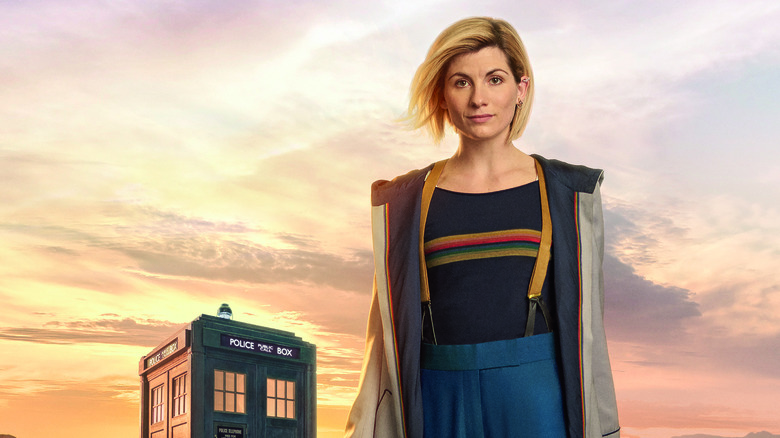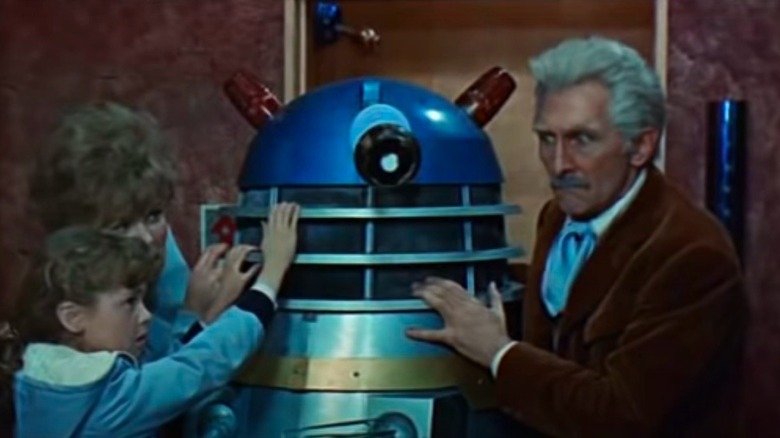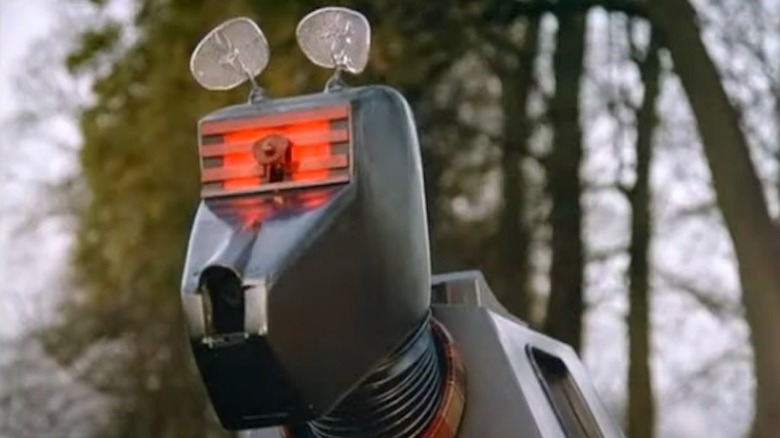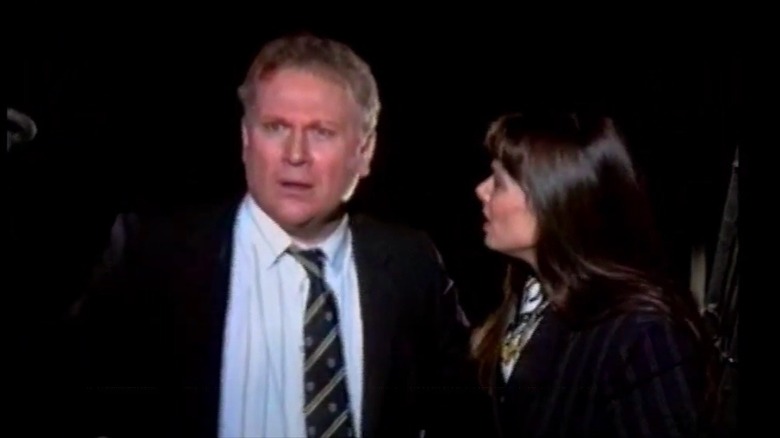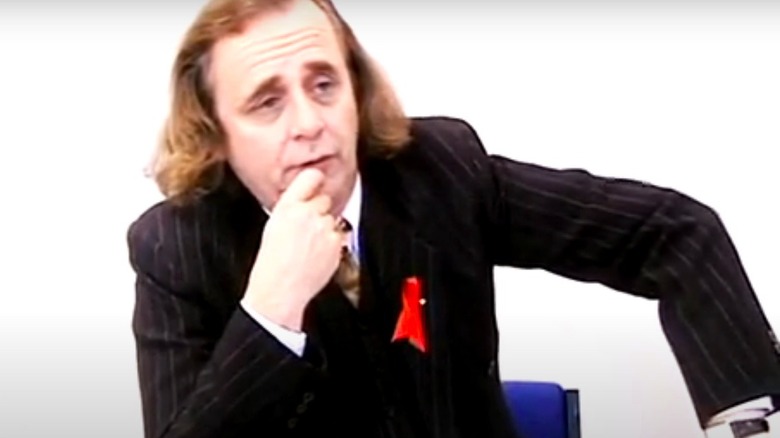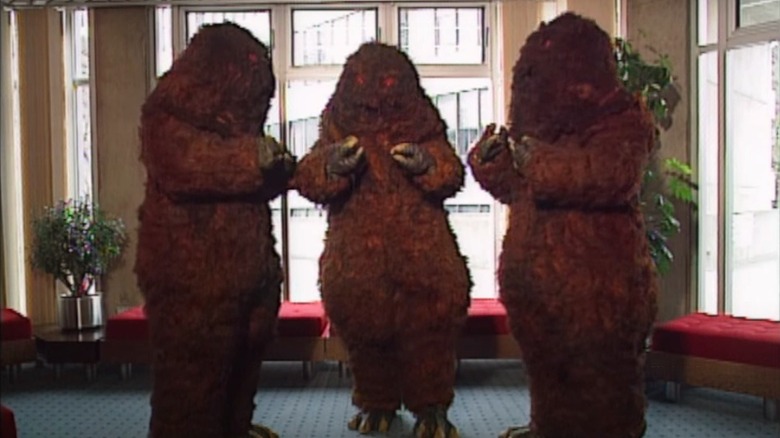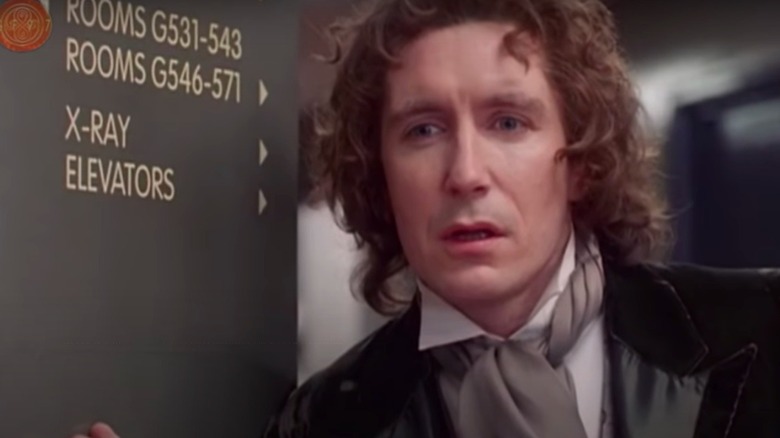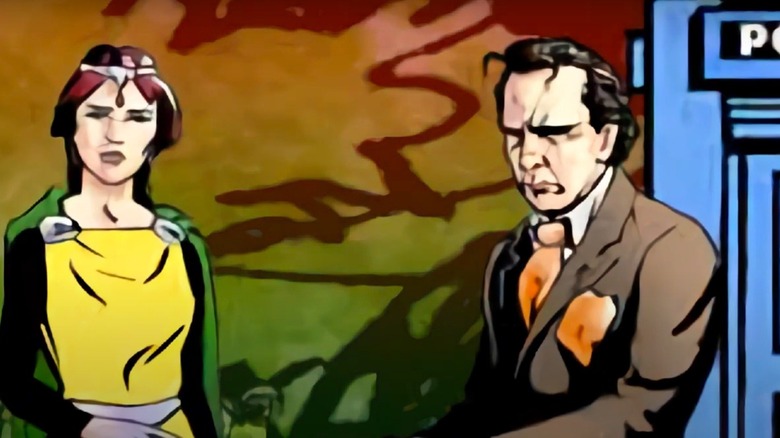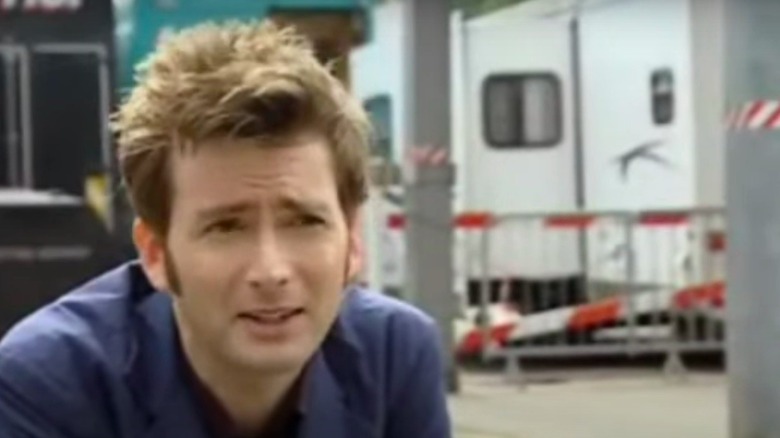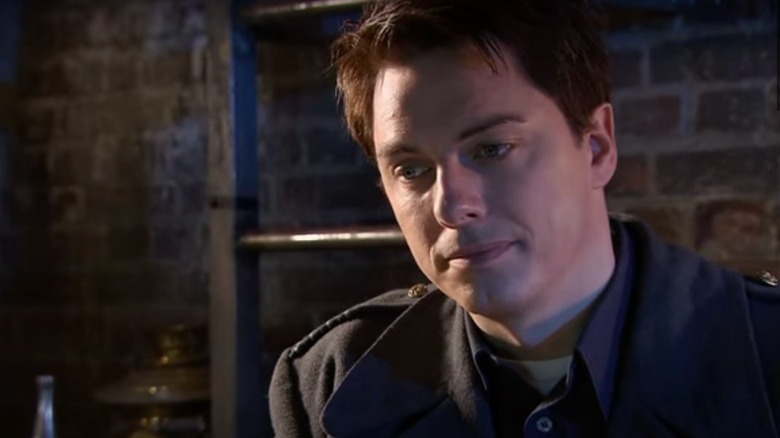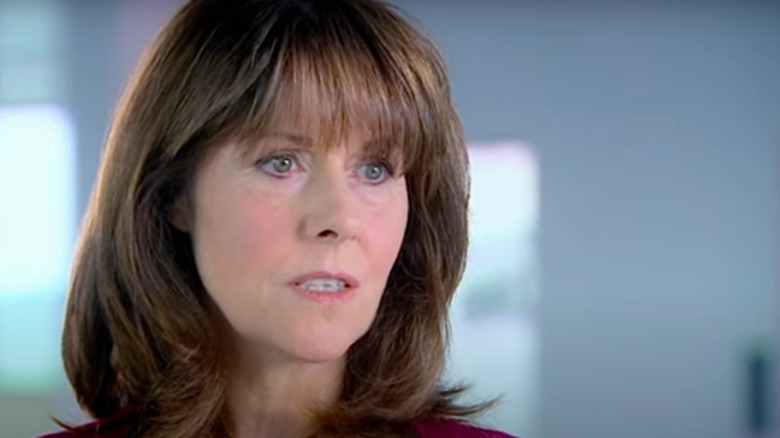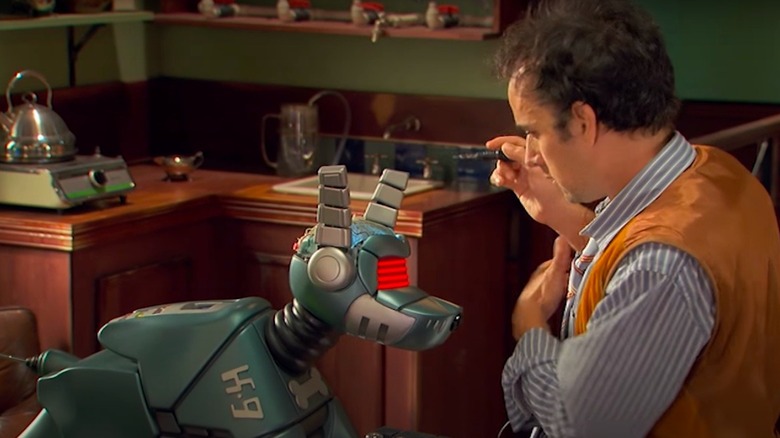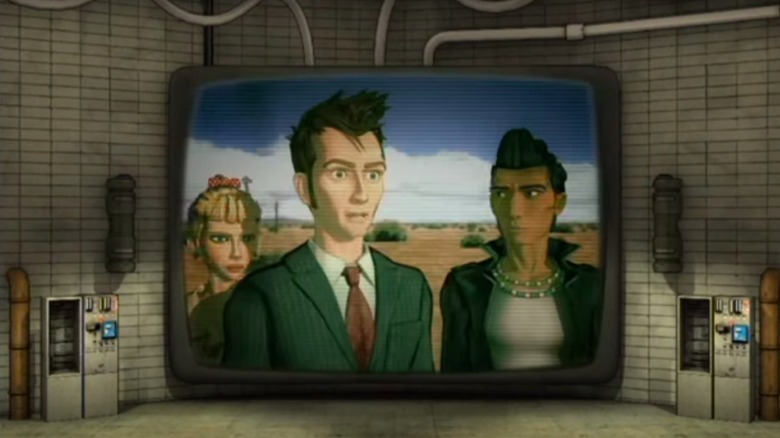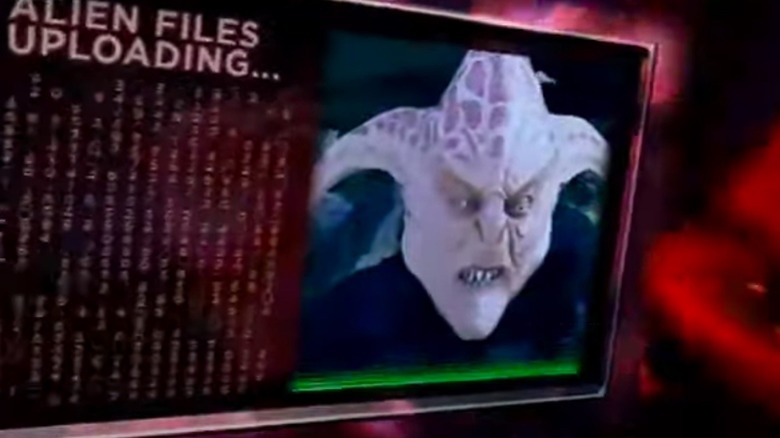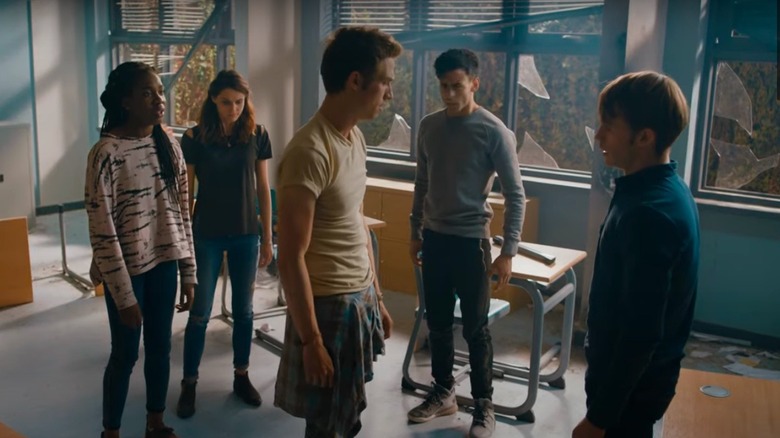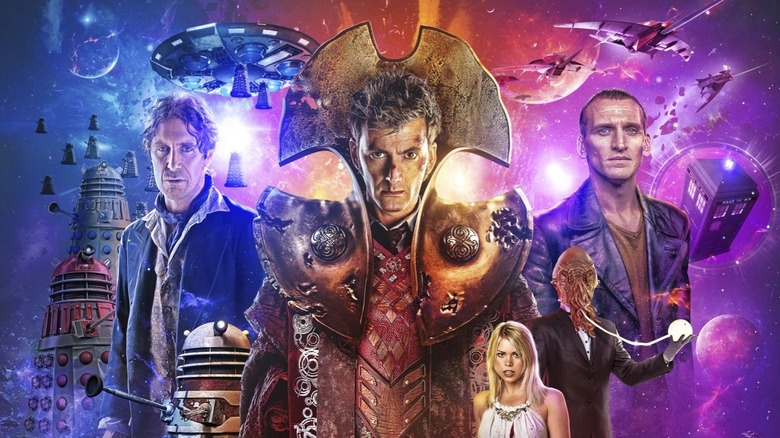Doctor Who Spinoffs You Didn't Know Existed
First making its debut back in 1963, "Doctor Who" has proven to be one of television's most enduring science fiction franchises. Having evolved thanks to countless reinventions over the decades, the series continues to chronicle the time-traveling, interplanetary adventures of the eternal Time Lord known only as the Doctor. Meanwhile, "Doctor Who" continues to captivate its loyal fans while engaging new ones as 13th Doctor Jodie Whittaker is preparing to relinquish her role to Ncuti Gatwa, who will make Whovian history as the first Black actor to play the role (just as Whittaker did the same as the first female Doctor).
While the original series ended in 1989, BBC's bold and edgy 2005 revival has proven to be an enduring hit. In fact, the show's massive popularity over the years has understandably led to numerous spinoffs, taking the series' mythos into some exciting new directions. While some of these may be fondly remembered by fans, others have faded into the annals of obscurity ... sometimes for very good reason. Read on for a look at these "Doctor Who" spinoffs you never knew existed.
Doctor Who and the Daleks (1965)
"Doctor Who" proved to be an instant hit with British kids after the original series' 1963 debut, and it didn't take long for plans to emerge that would expand the franchise to the big screen. The result was the first "Doctor Who" film, "Doctor Who and the Daleks," which debuted in 1965 and enlisted Peter Cushing (who had previously played the likes of Sherlock Holmes and vampire-killing Dr. Van Helsing) to play the title role. The film was successful enough to spawn a sequel the following year titled "Daleks — Invasion Earth: 2150 A.D." which, like the first movie, centered around the TV show's most iconic extraterrestrial threat, the Daleks.
Oddly enough, these movies veered significantly from the mythos laid out in the television series. While the protagonist in the TV show was an alien known as the Doctor (played in the first few seasons by actor William Hartnell), who journeyed through time and space in a vessel known as TARDIS), Cushing's character wasn't known as the Doctor, but as Dr. Who. He wasn't even a Time Lord, but an eccentric human scientist who had invented his own TARDIS. The plot involves Dr. Who showing off his new invention to his granddaughter, his niece, and her boyfriend, which results in accidentally transporting them all to the planet Skaros, where the peaceful race known as Thals are finding their very existence threatened by the warlike Daleks and their continual shrieks to "Ex-term-in-ate!"
K-9 and Company (1981)
A 1977 episode of "Doctor Who" introduced viewers to K-9, a robotic dog who joined the Doctor's revolving roster of time-and-space-traveling sidekicks. The mechanical mutt wasn't just a robot, but also a massively intelligent, weaponized computer (a laser blaster extended from an opening in his nose in times of peril). K-9 proved to be such a hit with the show's fans that in 1981 a spinoff was developed, "K-9 and Company." The premise featured "Doctor Who" fan-favorite companion Sarah Jane Smith (Elisabeth Sladen) returning to Earth after her sojourns with the Doctor and resuming her career as a journalist. In the pilot episode, Sarah Jane uncovers evidence that a friend is slated to be the victim of a ritualistic murder by a coven of pagan witches, so the Doctor sends her K-9 (voiced by John Leeson) in the hopes that the robot's assistance can help her crack the case and prevent the killing.
"K-9 and Company" was intended as the first officially sanctioned spinoff of "Doctor Who," but it never proceeded any further than the pilot stage. Ultimately, BBC opted not to pick up "K-9 and Company" to series, and instead aired the pilot as a TV movie (subtitled "A Girl's Best Friend") during the 1981 holiday season.
The Stranger (1991-1995)
It's debatable whether "The Stranger" is technically a spinoff of "Doctor Who," given that the series of six straight-to-video movies make no mention whatsoever of the Doctor or the TARDIS. However, it's no accident that "The Stranger" is generally viewed by Whovians as a spinoff. As ScreenRant pointed out, the videos represent BBV Productions' somewhat cynical attempt to skirt copyright laws while cashing in on the show's pre-existing audience by casting former "Doctor Who" star Colin Baker (a.k.a. the sixth incarnation of the Doctor) as the unnamed protagonist — the titular Stranger — who, like the Doctor, travels through time and space. In the first movie, 1991's "Summoned By Shadows," Baker is joined by Nicola Bryant, known to Whovians as companion Perri Brown during the mid-1980s. Also featured in the first movie was Michael Wisher, who portrayed Davros, the evil genius responsible for the Daleks.
In five subsequent movies — "More Than a Messiah" (1992), "In Memory Alone" (1993), "The Terror Game" (1994), "Breach of the Peace" (1994), and "Eye of the Beholder" (1995) — more actors associated with the series were brought in. These included Sophie Aldred (who played Ace, companion of the seventh Doctor), Louise Jameson (Leela, companion to the fourth Doctor), David Troughton (who played Peladon in several 1972 "Doctor Who" episodes), and Caroline John (Elizabeth "Liz" Shaw, companion to the third Doctor). In addition to the videos, "The Stranger" was also the basis for a series of four audio dramas.
P.R.O.B.E. (1994-2021)
"P.R.O.B.E." holds the distinction of being the first official live-action spinoff of "Doctor Who," a series of direct-to-video features beginning with the 1994 movie "The Zero Imperative" and extending all the way to the 2021 web series "Case Files" (although the initial series concluded with the 1996 movie "P.R.O.B.E.: Ghosts of Winterborne"). The series, also produced by BBV Productions, centered around the character of Liz Shaw (played by Caroline John), the Doctor's one-time companion and eventually a civilian member of the United Nations Intelligence Taskforce (UNIT), the covert British military organization devoted to battling extraterrestrial threats. Liz is working for the organization known as P.R.O.B.E., an acronym for the Preternatural Research Bureau. While the Doctor is never explicitly referenced, "P.R.O.B.E." is set within the same world and generously utilized the "Doctor Who" mythology. Another association came in the casting, with "P.R.O.B.E." featuring an array of former Doctors in non-Doctor roles, including Jon Pertwee, Peter Davison, Colin Baker, and Sylvester McCoy (a.k.a. Doctors #3, 5, 6, and 7, respectively).
Interestingly, the first few "P.R.O.B.E." features were written by actor-writer Mark Gatiss, who went on to appear in such acclaimed TV series as "Game of Thrones," "Sherlock," and, yes, "Doctor Who." In fact, Gatiss also wrote the screenplays for several episodes of the "Doctor Who" revival series, ranging from 2005's "The Unquiet Dead" to 2017's "Empress of Mars."
Downtime (1995)
Released as a straight-to-video movie in 1995, "Downtime" focused on Brigadier Lethbridge-Stewart (played by Nicholas Courtney), the now-retired commander of UNIT who frequently provided assistance to the Doctor in his various adventures. In "Downtime," the Brigadier finds himself sucked into a nefarious scheme headed up by Victoria Waterfield (Deborah Watling), who was the second Doctor's companion and is now the vice-chancellor of New World University.
As it turns out, the university is actually a front for Victoria's misguided efforts to assist the one-time "Doctor Who" antagonist known as the Great Intelligence (who has possessed the body of the university's chancellor) in his plot to take over the planet by infecting the world's computers with a virus. Assisting the plan, for reasons too convoluted to explain, is an army of robot Yetis, played in true "Doctor Who" fashion by actors in ridiculously unconvincing monster costumes. As Victoria seeks info on the Brigadier, she contacts Sarah Jane Smith, with Elisabeth Sladen reprising her "Doctor Who" role.
Doctor Who: The Movie (1996)
After the original "Doctor Who" ended its run in 1989, plans to revive the franchise for American television resulted in "Doctor Who: The Movie," which aired on the Fox network in 1996. With Paul McGann ("Withnail and I") as the Doctor and Eric Roberts ("Star 80") as the series' big bad The Master, the initial plan was for the movie to serve as a pilot that would kick off a stateside series. As the official "Doctor Who" website pointed out, the series was a co-production between 20th Century Fox, Universal Studios, and BBC, and aired in both the U.S. and the U.K. While ratings in the U.K were solid (9.1 million viewers watched), that was less true in America, where just 5 million or so tuned in.
Meanwhile, fans of the original witnessed the spectacle of the seventh Doctor Sylvester McCoy regenerating into McGann's eighth. While McGann played the Doctor for the shortest amount of time of any actor (the franchise remained idle until 2005), he also held the distinction of being the actor to play the Doctor for the longest period of time, from 1996 until 2005. Fans were delighted when McGann reprised the role in the 2013 "mini-episode" titled "The Night of the Doctor," which made its debut on YouTube and fit within the ongoing Time War storyline to explain the Doctor's absence during the period between "Doctor Who: The Movie" and the series' 2005 return.
Doctor Who: Death Comes to Time (2001)
A few years before BBC's 2005 revival of "Doctor Who," the network quenched the hunger of the Whovian fanbase with the 2001 animated web series "Doctor Who: Death Comes to Time." Sylvester McCoy reprised his role to provide the voice of the seventh Doctor in the five-episode series, in which the Doctor faced off against General Tannis (John Sessions) and his plans to rule the universe. In addition, Sophie Aldred returned to voice companion Ace, with additional voice talent including actor and comedian Stephen Fry, actor Kevin Eldon (whose credits include "Sanditon" and "Hot Fuzz"), and "Buffy the Vampire Slayer" star Anthony Head.
"Doctor Who: Death Comes to Time" was BBC's one and only attempt to feature the series via webcast, and reviews of the new-media production at the time were mixed. "McCoy as the Doctor and Aldred as companion Ace recreate their television characters extremely well," wrote the BBC's William Gallagher in his review. "But the rest of the cast are new to it and in almost every case have trouble making their characters believable," he added. "But then they would because the underlying story and the script are like fan fiction rather than a BBC Online drama."
Doctor Who Confidential (2005-2011)
In concert with the 2005 revival of "Doctor Who," which kicked off with Christopher Eccleston as the ninth Doctor (he played the role for a single season before passing it on to David Tennant as the 10th), BBC also began producing a companion documentary series. Titled "Doctor Who Confidential," the series aired on BBC Three and offered fans a deep-dive behind-the-scenes look at the making of each episode.
Despite its popularity with fans, The Guardian reported that BBC canceled "Doctor Who Confidential" in 2011 due to cost-cutting measures. This led to a petition and a Twitter campaign aimed at saving the show, although neither achieved its intended goal. Matt Smith, who was starring as the Doctor at the time, was particularly displeased with BBC's decision to axe the show. "[I was] really sorry," Smith told What's On TV, as reported by Digital Spy. "It's a pity as I think it's a show which can reinvent itself year on year and it's one of the biggest shows on BBC Three." Added Smith: "I guess people come in and have new ideas and want to have their own fresh take on it. But, hey, some you win, some you lose."
Torchwood (2006-2011)
Arguably the best-known spinoff of "Doctor Who," "Torchwood" made its debut just one year after the series' return in 2005. This show centered around fan-favorite Captain Jack Harkness (John Barrowman), who first met the Doctor during the 1940s and was inadvertently made immortal. Jack heads up Torchwood Three, an elite division of the Torchwood Institute, an updated version of UNIT in that it's a covert British organization tasked with protecting Earth from extraterrestrial threats. Serving alongside him are former cop Gwen Cooper (Eve Myles), medical officer Owen Harper (Burn Gorman), bisexual field agent Ianto Jones (who expresses his romantic feelings for Jack, who's also bi) played by Gareth David-Lloyd, and tech expert/computer whiz Toshiko "Tosh" Sato (Naoko Mori).
While the new "Doctor Who" was grittier than the original, it was still family-friendly, something that could not be said about "Torchwood." As reviewer Robert Lloyd wrote in the Los Angeles Times, the characters in the show are "unusually elastic in their sexuality," pointing out that "Torchwood" is far from "a kiddie show" by pointing to a plot involving an alien that "feeds off of human orgasms." According to ScreenRant, "Torchwood" was never officially canceled but hasn't aired since its fourth season in 2011 (the reason appears to be series creator Russell T. Davies desire to work on various other projects). Meanwhile, plans for a "Torchwood" audio-only drama that would have reunited Jack with David Tennant's Doctor (titled "Torchwood: Absent Friends") was scuttled in 2021.
Totally Doctor Who (2006-2007)
In addition to the "Doctor Who" companion show "Doctor Who Confidential," in 2006 BBC launched "Totally Doctor Who" on its kids-themed CBBC channel. Aimed at younger viewers, "Totally Doctor Who" utilized a talk show format in which hosts Barney Harwood and Kirsten O'Brien welcomed "Doctor Who" stars to discuss their roles. In addition, noted the show's official website, "Totally Doctor Who" also featured "exclusive behind-the-scenes clips" and fun competitions to draw in viewers. One of these, coinciding with the launch of the show, was intended to recruit eight "cadets" for the show's "Companion Academy," selected after enduring "the grueling physical and mental challenges of the Academy" with the grand prize — a day-long visit to the "Doctor Who" set in Cardiff, Wales — waiting at the finish line.
The 30-minute series didn't last long, with just 25 episodes aired in 2006 and 2007. Along the way, guests on the show included "Doctor Who" star David Tennant, executive producer Russell T. Davies, and Peter Capaldi, who discussed his recurring "Torchwood" role as John Frobisher years before being tapped to be the 12th Doctor.
The Sarah Jane Adventures (2007-2011)
Elisabeth Sladen was as close to "Doctor Who" royalty as it gets. Her character Sarah Jane Smith first appeared on the show in 1973 as a companion to both John Pertwee's and Tom Baker's iterations of the Doctor and returned as a recurring guest star throughout the ensuing years. In fact, Sladen reprised Sarah Jane in a 2006 episode of "Doctor Who" alongside David Tennant. While promoting that appearance, she told BBC that would be "the last time that you'll see her in the new series, but not the last time you'll have seen Sarah Jane — I hope not."
As she presciently predicted, she was soon seen in "The Sarah Jane Adventures," which debuted in early 2007. Unlike her previous star turn in the ill-fated "K-9 and Company" pilot, it was Sarah Jane and not her robot dog sidekick that was the focus. Back to being an investigative journalist, she is partnered with some teenage pals to fend off encroaching alien threats to the planet. "The Sarah Jane Adventures" continued until 2011, the show ending with Sladen's death at age 65. Because the series was abruptly halted without any resolution, in 2020 "Doctor Who" exec producer Russell T. Davies wrote a special episode, debuting on social media, to conclude the decades-long story of Sarah Jane Smith.
K9 (2009)
More than 20 years after the BBC opted not to proceed with its "Doctor Who" spinoff "K-9 and Company," another attempt was made to develop a show centering on the Doctor's robotic dog sidekick. The result was 2009's "K9," with actor John Leeson tapped to supply K9's voice, which he first originated back in the 1970s. Given that the latest iteration of K9 made a few appearances in "The Sarah Jane Adventures," "K9" — which ran for two 13-episode seasons — can be seen as a spinoff of a spinoff.
As co-creator Bob Baker explained in a press release announcing the show, "K9" was aimed at "younger 'Doctor Who' fans," with the character given "a new lease of life and a new look." Meanwhile, a series synopsis from production company Stewart & Wall Entertainment detailed the premise, in which a trio of British teenagers and a professor find themselves befriended by K9 after the latter's experiments in time travel "ripped K9 from space and time and now holds him bound to Earth." Being on Earth, Baker said in another interview, wouldn't prevent the robotic dog from battling "a menagerie of super monster 'uglies'" before the show ended its run in 2010.
Doctor Who: Dreamland (2009)
David Tennant reprised his role as the 10th Doctor in an animated serial, "Doctor Who: Dreamland," that was originally launched on BBC's Red Button digital service, the "Doctor Who" website, and BBC's iPlayer. According to a 2009 BBC press release, Tennant's animated Doctor goes back in time to Roswell, New Mexico circa 1947, at the time when a UFO has long been rumored to have crashed there. "Dreamland is a remarkable project and I'm thrilled with it," said "Doctor Who" exec producer Russell T. Davies of "Dreamland," proclaiming that it "promises to send the Doctor into a whole new visual dimension."
"Dreamland," noted Den of Geek, was actually the second animated project featuring Tennant's Doctor. As the Telegraph reported, a similar serial titled "Doctor Who: The Infinite Quest" was produced in 2007, consisting of 13 short episodes of less than four minutes in length. Each episode of "The Infinite Quest" initially aired within an episode of "Totally Doctor Who."
Sarah Jane's Alien Files (2010)
Not only did "The Sarah Jane Adventures" provide a launching pad for "K9," but it also spawned a second spinoff, "Sarah Jane's Alien Files," launching in 2010. Also known as "SJA: Alien Files," the show was a series of 30-minute specials that were essentially clip shows compiling previously filmed footage from "The Sarah Janes Adventures" (and, occasionally, "Doctor Who") that focused on the various extraterrestrial beings who found themselves facing off against Sarah Jane Smith and her plucky pals. The premise of the show was to give viewers additional insight into those alien characters beyond what was provided during "The Sarah Jane Adventures." While the specials couldn't have cost much to produce, the "Alien Files" ultimately didn't last for too long as only six specials were produced.
Interestingly enough, the series lives on — in a sense, at least — on TikTok, where brief clips under the banner of "sarah jane's alien files" have racked up more than 47 million views.
Class (2016)
"Doctor Who" fans were greeted with yet another spinoff titled "Class." This one was set at the fictional Coal Hill Academy, a recurring locale for the Doctor's adventures over the years. The series focused on four students (played by Greg Austin, Sophie Hopkins, Fady Elsayed, and Vivian Oparah) and their physics teacher (Katherine Kelly) who have been tasked by the 12th Doctor (Peter Capaldi) to help him guard the planet from malevolent extraterrestrials. As series creator Patrick Ness explained in an interview with Empire, the idea was to focus on what happens to Earthlings who become involved with the Doctor after he saves the day and exits, leaving them to pick up the pieces. "How do you deal with it? I'm interested in real consequences," said Ness. "The Doctor is always exciting, but he never stays. He goes off on the next adventure. What happens to real people?"
As FanSided reported, ratings for the new spinoff were "disappointing." While big plans had been set in motion (including a series of YA novels), the poor ratings weren't enough to justify a second season, leading "Class" to be canceled. However, the story didn't entirely end there, with the original cast returning to reprise their roles in 2018 for six audio dramas. "The characters and their relationships are key to the success of a series like 'Class,' and the intimacy of the audio medium allows us to bring that to the fore," explained Ness of the series' audio-only return.
TIme Lord Victorious (2020-2021)
In 2020, BBC announced a new "Doctor Who" saga that was promised to be "a story like no other." Featuring several past stars from the franchise, the multi-platform saga "Time Lord Victorious" unfolded over the course of 12 weeks and is arguably the most ambitious project in the franchise's 50-plus-year history. "Time Lord Victorious" encompassed an "immersive" theatrical presentation ("Doctor Who: Time Fracture"), several audio adventures (featuring previous stars David Tennant, Paul McGann, Christopher Eccleston, and Tom Baker reprising their respective iterations of the Doctor), an animated feature ("Daleks!"), short stories, books, comics, games, digital trading cards, and even a t-shirt. There were even two "escape room" experiences — "The Hollow Planet," and "A Dalek Awakens."
As The Guardian reported, "Time Lord Victorious" took more than a year to create, with more than 5,700 actors vying for roles. Director Tom Maller described the project as "a love letter" to "Doctor Who" fans, although he also admitted there was so much content on so many different platforms that "when you do the maths it's near impossible to see or do everything." However, he also pointed out that while "Time Lord Victorious" was both extensive and exhaustive, it could also be enjoyed by casual fans who may not have an encyclopedic recall of "Doctor Who" lore. "This is a standalone experience," he explained. "There's a beginning, middle, and end that are explained, then you experience, then you leave with the memory forever."
